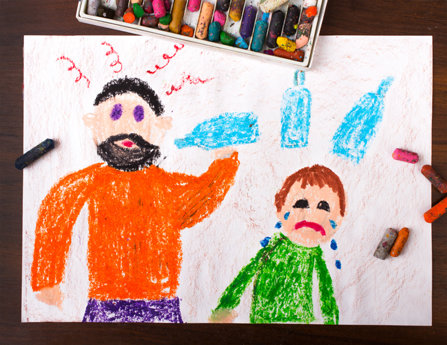How The Stigma of Addiction Ultimately Hurts Children

Hello, my name is Julie, and I used to struggle with alcohol addiction. After attending addiction treatment in 2012, I became certified as an addiction counselor because I wanted to help other people overcome their addictions. Since getting sober, I have gotten married, have two beautiful children, have paid off my student loans, and have become a homeowner. None of this would have been possible for me while I was still drinking. These days many people would not believe me if I told them that I have also been to jail, detox, and rehab because I was addicted to alcohol.
Many people who do not know that I used to be an alcoholic appear shocked when I open up to them about my past. I have heard things like, “I would never think you used to have an addiction; you seem like such a nice person!” Or “You don’t look like someone who used to be an alcoholic.” Although well-intentioned, comments like these highlight the stigma associated with people who have an addiction. When we assume that addicts have to look or talk a certain way, we are stereotyping a group of people and making it more difficult for them to get help. Believe it or not, those who have an addiction can still be good people.
The stigma of addiction is nothing new; it has been around for a long time. Many people look down on those who have an addiction and think of them as “less than” or “undeserving” of help. I’ve seen this repeatedly while scrolling through my social media feeds, in people making hurtful comments about addicts and the people who love them. For whatever reason, people tend to forget that someone struggling with addiction is still a human being deserving of empathy and compassion. I am not trying to say that addicts should be free of the consequences of their addiction, but rather that maybe if we as a society began to treat them with more respect, more people would be willing to reach out for help.
In the beginning stages of my addiction, I was hesitant to admit that I had a problem. I felt this way for several reasons, one of them being that, in all honesty, I was embarrassed to admit to it because I thought people would look down on me. When seeing how a good many people in our society react to those struggling with addiction, it’s not hard to understand why someone would be hesitant to admit they have a problem.
The thing is that the stigma of addiction does nothing to help the problem and only perpetuates the very thing it claims to oppose. Stereotypes not only hurt addicts, but they also hurt everyone that is associated with them. These far-reaching ramifications become amplified because addiction is a condition that harms the person dealing with it firsthand and everyone who loves that person as well. Perhaps it has the most significant impact on children whose parents are struggling with addiction. The longer a parent struggling with addiction puts off getting help, the longer it will affect their children.
So the stigma that surrounds addiction prevents many people from getting help because it can be hard to admit you have a problem when you might face judgment and criticism from others by doing so. Addressing addiction is often best done in a professional setting with professional help. Some people can get sober on their own, but most people dealing with substance abuse issues would greatly benefit from some form of professional help.
Children of Addicts
There is no denying that addiction hurts everyone connected to it. The impact is perhaps the most influential on children whose parents are struggling with this issue. The difficult thing is that unlike adults, children of addicts are usually unable to leave the situation. The good news is that when an addict receives the help they need to get better; it benefits their entire family.

According to a report given by the Substance Abuse and Mental Health Services Administration (SAMHSA), an estimated 8.7 million children under the age of 17 live in a home with at least one person who is dealing with substance abuse. This statistic represents millions of parents and children who are being negatively impacted by this issue.
SAMHSA also states that children growing up in a home of substance abuse are more likely to experience a variety of problems. Parental neglect is frequently a common side effect of addiction when a child’s needs go unmet. Abuse in various forms also becomes more likely to occur when a child’s parents deal with substance abuse. It is no secret that growing up in a home influenced by addiction can lead to long-term consequences such as anxiety, depression, and substance abuse later in life.
Another potential negative impact that a parent’s addiction can have on their children is having to grow up without parents due to incarceration or death. According to the Centers for Disease Control and Prevention (CDC), 67,367 drug overdose deaths occurred in 2018 alone. Sometimes it becomes easy to look at statistics as simple numbers, but when you think about how many lives were lost, the numbers become unsettling. These statistics do not consider the number of lives impacted by the people who were left behind. It is heartbreaking to think about how many children became orphans due to these deaths. How many mothers and fathers lost their children to this terrible condition?
The stigma of addiction does nothing to help the problem. It does not make people less likely to use, and it certainly does not help motivate anyone to get better. The only thing that the stigma of addiction does do is keep people stuck in the trap of substance abuse. If more people began to treat those suffering from addiction like human beings in need of help, then perhaps more people would be willing to reach out for it. One of the biggest things that can combat the prejudice that addicts face is better educating the public on this issue. There is no “one size fits all” for addiction, and it can happen to anybody.

I, for one, am grateful that I had a family that did not reject me because of my addiction. They did have to resort to showing me some tough love by having an intervention and refusing to enable me, but this ultimately led me to accept the help that I so desperately needed. The next time you see an addict on the street, it would be wise to remember that you are seeing a human being that is struggling. We are all people, and sometimes we all need help getting back up on our feet. The sooner we can remember this as a society and begin to end the stigma surrounding addiction, the sooner we can fully address the problem. People are capable of extraordinary change, and who knows what sort of lasting positive impact that can create for future generations.
Sources:
- https://www.cdc.gov/drugoverdose/data/statedeaths.html
- https://www.samhsa.gov/data/sites/default/files/report_3223/ShortReport-3223.html
- https://ncsacw.samhsa.gov/files/TrainingPackage/MOD2/EffectsofSubstanceAbuse.pdf


 ®
®